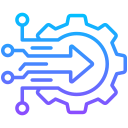The Future of Work: AI's Role in 2025 Industries
AI-Driven Transformation Across Key Industries
Artificial intelligence applications are dramatically improving diagnostics, patient care, and drug development. In 2025, AI-powered tools help clinicians analyze complex medical datasets, identify patterns undetectable to the human eye, and provide tailored treatment recommendations. This leads to more accurate diagnoses and better patient outcomes. Moreover, AI is expediting pharmaceutical research by simulating drug interactions and predicting effectiveness, shrinking timelines from years to months. Telemedicine and remote monitoring, empowered by machine learning, ensure continuous, proactive care for patients. Human practitioners, freed from data overload and administrative tasks, refocus on empathy-driven aspects of care, combining the best of technology with the indispensable value of human judgment.

The Rise of Human-AI Collaboration
Augmenting Human Expertise
AI acts as a dynamic support system, enhancing human capabilities rather than replacing them. Professionals in fields ranging from financial analysis to legal services use AI-driven platforms to process vast quantities of data, spot anomalies, and present actionable insights. This support allows experts to make more accurate, timely, and confident decisions. Creative industries also benefit: AI can generate design inspiration, analyze audience preferences, and even compose initial drafts for campaigns, enabling humans to concentrate on refining and innovating. By shouldering routine or repetitive tasks, AI lets employees devote time to uniquely human pursuits like strategy, empathy, and ethical reasoning.
Evolving Team Dynamics
As human-AI collaboration intensifies, traditional team structures and roles undergo transformation. Colleagues now include not just fellow employees, but also AI agents capable of handling routine communications, scheduling, and data crunching. This shift encourages businesses to rethink skills development, emphasizing adaptability, technology literacy, and emotional intelligence alongside technical ability. Teams become more agile and interdisciplinary, harnessing AI to unearth new opportunities and respond to challenges with rapid, informed action. Leadership styles evolve in tandem, favoring openness to innovation, transparency in decision-making, and fostering environments where technology augments rather than overshadows human potential.
Redefining Leadership and Management
Management in the era of AI requires fresh approaches to guiding teams and scaling ideas. Leaders must understand not only how to use artificial intelligence, but also how to integrate it in ways that align with organizational values and objectives. By leveraging AI-driven analytics, managers obtain real-time feedback on operations, workforce sentiment, and market shifts, enabling proactive strategies and continuous improvement. Effective leaders foster a culture of learning, experimentation, and ethical AI use. They prioritize upskilling and reskilling, ensuring employees do not just keep pace with technological change but actively shape it. This new era of leadership values empathy, inclusivity, and the ability to bridge human creativity with machine intelligence.
Workforce Evolution: Skills and Adaptation
The New In-Demand Skills
Workers entering or navigating the job market in 2025 need a hybrid skillset that transcends traditional educational boundaries. Proficiencies in data analysis, programming, and AI literacy become increasingly important, even in non-technical fields. However, success isn’t solely about hard skills; problem-solving abilities, creativity, and strong communication remain indispensable. Emotional intelligence and cultural awareness gain prominence as teams grow more diverse and geographically dispersed. The interplay of technical expertise and human insight equips individuals to manage and interpret AI-driven outputs, adapt to new tools, and forge meaningful, productive careers in a rapidly shifting environment.
Lifelong Learning as a Norm
The notion of a “finished” education is obsolete in the AI-driven future. Employees at all career stages must invest in perpetual learning to keep up with evolving technologies and shifting business models. Companies increasingly offer upskilling programs, digital academies, and incentives for self-directed learning, recognizing that their competitiveness hinges on an agile workforce. Educational institutions redesign curricula to emphasize data literacy, computational thinking, and adaptability. This approach fosters a culture where learning is not only reactive but proactive—anticipating emerging trends and ensuring both organizations and their people remain ahead of the curve in a world where the only constant is change.
Adapting to Continuous Change
Agility becomes a core competency as industries and job requirements evolve at an unprecedented pace. Employees must cultivate the ability to adjust rapidly to new tools, processes, and market realities. Change management, both at the individual and organizational level, is integral to ensuring successful AI adoption. Forward-thinking businesses actively involve their workforce in transformation initiatives, seeking feedback and co-creating solutions. At the personal level, resilience and a growth mindset empower individuals to view disruption as an opportunity rather than a threat. The adaptability cultivated now will be the bedrock of professional success and satisfaction in the AI-infused workplace of 2025.
